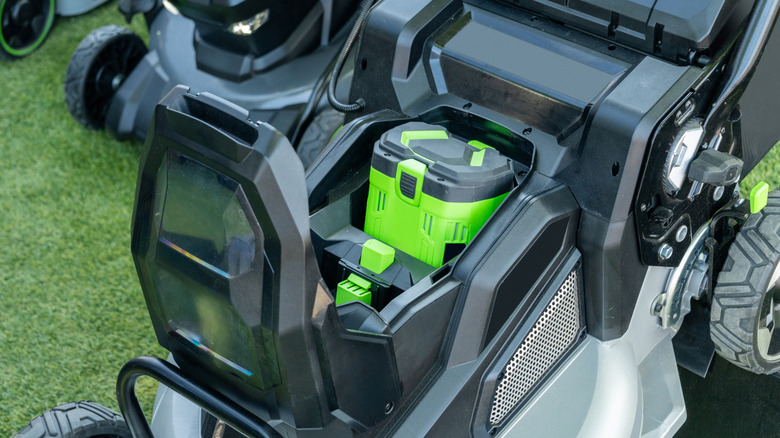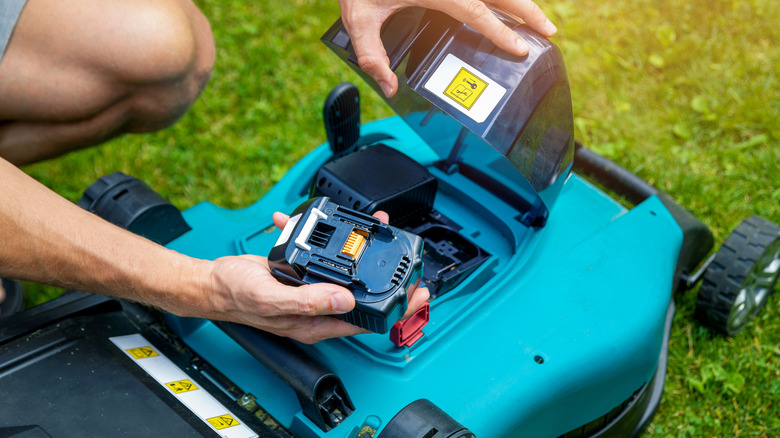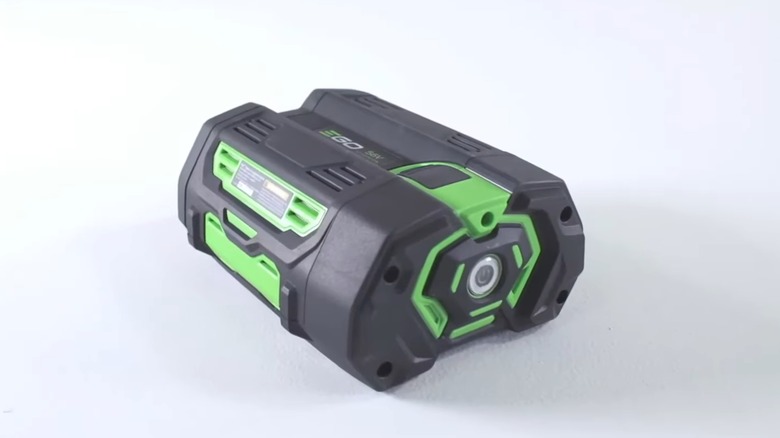Can You Leave A Battery In A Lawn Mower?
While gasoline is still widely used across the landscaping industry, battery power has taken a more prominent role in recent decades. Power drills, saws, trimmers, and countless other hand power tools utilize lithium-ion batteries to get their respective jobs done. This power supply has even made its way to larger appliances, too, such as push lawn mowers. No more refueling, and no more spark plugs; just make sure your battery is charged and you're ready to start.
It should be said that battery-operated lawn mower maintenance does come with a learning curve, though. First and foremost is what to do with the battery when the mower isn't in use. While this can vary depending on the model and the manufacturer's instructions, in most cases, it's recommended that the battery isn't left in the mower when it's not in use. This is especially true if you're packing your mower up for months at a time. If you get done mowing and happen to forget to remove it, leaving it in for a night or two isn't likely to ruin it. Still, if you realize you've made this mistake, it's in your best interest to remove the battery as soon as possible. Otherwise, you risk your lithium-ion battery suffering from shortened lifespans between charges, corrosion, and other damage.
As great as they are, there are some big problems and disadvantages to lithium-ion batteries, so to get the most out of them, it's wise to take proper care of them. When it's time to store your electric mower battery during the off-season, you want to do it correctly.
How to prepare a lawn mower battery for long-term storage
Even though the lawn mowing season can feel like it lasts forever, eventually, it will indeed come to an end. Once it does, the mower can go away until it's needed the following year, along with any other related lawn equipment. This means that it's time for proper mower storage and, for those with an electric unit, proper storage of the battery behind that mower. After all, even the most powerful electric mowers from the major brands on the market are only as powerful as the batteries inside them, so it's crucial to make sure the frigid winter months don't wreck your battery by the time spring rolls around.
Much like the terms of battery removal, the specifics of mower battery storage can vary from brand to brand and mower to mower. However, with that said, there are some general rules that have basically become standard across the industry. First is to store your battery outside of your mower in a relatively cool, dry environment — the specific temperature range should be present in your mower's manual — free of the fear of freezing or excess humidity. Keeping it out of direct sunlight to prevent overheating is important, too. As far as charge level, this is also something to consult your owner's manual about. Some recommend only a partial charge for long-term storage, while others claim a full charge is needed.
So long as you take care of your lawn mower's battery, storing it and using it right, it should last you many years. Of course, adhering to charging best practices isn't an aspect of responsible battery ownership to be ignored either.
Just as important as proper storage is proper charging
As if proper use and care weren't important enough to the life of an electric lawn mower battery, there's also the matter of charging. While this may seem simple enough, there are several key considerations to keep in mind when doing so. Similarly to lawn mower batteries, chargers shouldn't be left in humid, temperature-extreme areas. It's also not uncommon for manufacturers to note that the charger shouldn't be used outdoors, as it's designed for use indoors only.
Perhaps the most important thing to remember is that it's not generally a good idea to leave a lawn mower battery on a charger any longer than it needs to be. That means removing it once it's fully charged, not leaving it attached overnight or for days at a time. Failure to do so can have catastrophic consequences for lithium-ion batteries, ranging from a significant reduction in their useful lifespan to excess heat generation — a catalyst for fires or even explosions. So, as a rule of thumb, just remember that whether it's the mower itself or the charger, leaving a mower battery attached and unchecked is a no-go.
Just as electric and gas-powered lawn mowers will cost you different amounts in the long run, their methods of maintenance are clearly different in major ways. Playing it safe and smart with your mower's battery, from remembering to remove it from the mower to charging it responsibly, will ensure you get the most out of it season after season.


